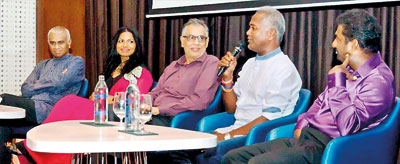Rozaine launches her second book based on a column in the Business Times
View(s):Rozaine Cooray’s second book “From Crisis to Character” containing a series of columns she wrote for the Business Times on psychology issues in the workplace was launched last week in Colombo before a distinguished gathering.
The presentation of the first copy of her book, to her father, was preceded by an illuminating panel discussion which comprised the author and Romesh Moraes (Executive Director of Finleys), Aslam Omar (Director of Brandix Lanka Ltd), Muttiah Muralidaran (Cricketer), and Kushil Gunasekara (Founder/ Chief Trustee of Foundation of Goodness).

Picture shows from left: Romesh Moraes, Rozaine Cooray, Aslam Omar, Kushil Gunasekara and Muttiah Muralidaran.
Mr. Moraes opened the discussion describing how he had read Rozaine’s book from cover to cover, particularly in the last three days prior to the launch, when the content of the book kept him awake, and challenged his own ‘take’ on organizational concepts that were elaborated in a form of simple real-life anecdotes.
He also spoke about the importance of building national character, and how ultimately Sri Lanka will be known for that character as illustrated by the author.
Saying the book inspired his work in the corporate sector, he recalled his professional and personal journey and how he dealt with crises.
Mr. Muralidaran, one of Sri Lanka’s best known figures in the world, noted the vital part played by people around him in providing supporting at the critical time to overcome crises. In building one’s character, he spoke of the encouragement and support of many which are crucial in character growth.
He cited examples from his childhood and his cricket career on how he had overcome adversity and succeeded in beatint the odds, especially on two occasions – when the 1983 ethnic riots destroyed the family business and secondly when he was shockingly ‘no balled’ in Australia and accused of chucking.
Mr. Omar, a reader of Rozaine’s columns, spoke about the crisis that hit the apparel industry in Sri Lanka and how it was overcome.
He referred to the end of the quota regime in the early 2000s and the GSP crisis in the mid-2000s, and described how the industry rose above the tide to greater levels.
The key reason for this resilience of the industry was due to, in his words, the ability to innovate, transform and bring about new solutions and processes which created profitability and growth. “Crisis pushes one to break into new ground and one needs to remember that innovation would never have come about unless the crisis had forced one to do so,” he noted.
Mr. Gunasekara referred to the ability to find an opportunity in every crisis and how that mindset allows an individual to overcome a crisis.Relating his experience in Seenigama when the tsunami devoured the village and the normality of life, he noted how after 10 years, the village stands as a model village of community- character that supports many more communities, villages and people from around the country.
Ms. Cooray spoke on the gap between what universities produce and the needs of the organizational world. These formed the basis of her articles in the Business Times.
She said “more than a motivated workforce, we need an inspired workforce who can see and feel the long term vision, a long term purpose. And we need leaders who can inspire. A leader has to have the key talent – the X factor- to inflame the confidence in others to do their best and to be their best”.


